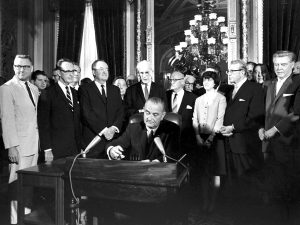Subscriber Benefit
As a subscriber you can listen to articles at work, in the car, or while you work out. Subscribe NowNearly 60 years after the Voting Rights Act was signed into law and expanded voting access for Americans, Indiana lawyers and activists say some state residents still face hurdles in exercising their right to vote.
According to the Indiana Civics Health Index, Indiana ranks 50th in voter turnout.

Indiana Attorney General Todd Rokita recently co-led a letter with 22 states to Congress supporting the passage of the Safeguard American Voter Eligibility Act.
“This commonsense piece of legislation is needed to ensure what should be two simple concepts – that our elections are secure and our elections are protected from illegal voters,” Rokita said in a news release. “With millions of illegal aliens entering the country on President Joe Biden’s watch, it’s imperative that we take these steps to ensure our elections are safe and secure.”
The act would require people to provide proof of citizenship when registering to vote.
Common Cause Indiana Executive Director Julia Vaughn said the bill is based on politics.
“There is no crisis of non-citizens voting in our country. It’s already a federal crime,” Vaughn said.
Currently, the bill is still in the early stages of the legislative process and has only been introduced and referred to the Committee on Rules and Administration.
Indiana University Maurer School of Law Professor Luis Fuentes-Rohwer said the Voting Rights Act is a shell of what it used to be and on its last legs.

“What we need is a universal access to voting,” Fuentes-Rohwer said. “We need ways by which we make it easier and more sensible and free of fraud,”
He said at this time, politicians aren’t interested in helping people vote.
“We needed the Voting Rights Act when it was passed back in the 60s, and we need it now more than ever,” Vaughn said.
In the Hoosier state
During the last legislative session, the Indiana General Assembly passed House Enrolled Act 1264.
The bill’s intent is to discover any non-citizens on the voting roll.
The law takes a list of temporary people who have been issued a temporary ID by the Bureau of Motor Vehicles and compares it with the voting rolls.
“But the problem is that this data that they’re going to use from the Bureau of Motor Vehicles is very dated. It could be up to 10 years old. So in that time, these people who were once immigrants could have become naturalized citizens,” Vaughn said.
She said the law is political opinion and not backed by facts.
“We’ve got an access problem here in Indiana. We don’t have a security problem,” Vaughn said.

In the 2023 legislative session, a bill was passed that made it so that Hoosiers have to put down their voter ID number or number they used when registering to vote when applying for an absentee ballot.
“It’s not exactly a blood draw yet, but it seems like that’s where we’re edging toward,” Marion County Clerk Kate Sweeney Bell said.
She said if people do not use the number they used when registering to vote, like their driver’s license number or last four digits of their social security number, the clerk is required to throw out their application.

“It is another hurdle. I realize that some people must be scared that bad actors are trying to vote in our elections. We have not found that to be the case,” Sweeney Bell said.
Sweeney Bell said that they do notify people when they have to throw out their applications and try to help them get all the correct information.
Candidate access to the ballot is another issue attorneys are seeing that isn’t going away.
Michelle Harter with Lekse Harter LLC represented farmer John Rust, who wanted to be on the ballot as a Republican but did not have the backing of the party.
Rust ran into Indiana’s law on party affiliation when voting in a primary.
The law requires a Hoosier to have voted in the same party in the last two primary elections to campaign for an elected position within that party.
Rust had voted as a Republican in one primary and a Democrat in another.
After challenging the Indiana law at all levels in the state, Rust has now petitioned the U.S. Supreme Court to hear his case.
The nation’s highest court will decide whether it will take on his case at the end of September. The state of Indiana declined to submit any response to the petition.
Harter added that while the Voting Rights Act was about race and gender and other categories of exclusion, she’s seeing a shift in exclusion.
“We’ve shifted the categories of people being excluded, and now it’s more socioeconomic, and more life circumstances and disability and other things,” Harter said. “They found other ways to limit it, so that even if you do vote, you know less choices, or your vote’s diluted because the party gets to do so much of the work instead of the voter.”
Another candidate Harter represented was Democrat Tamie Dixon-Tatum, who had to collect signatures to appear on the ballot for governor.
According to the Indiana Election Commission, Dixon-Tatum did not submit enough signatures.
“It seems like year after year that minority women are often the ones who are not making it because of this petitioning requirement,” Harter said.
Harter noted that it takes a lot of time, money and energy to collect signatures to petition to be on the primary ballot, and if a hopeful candidate does not have party backing or an army of supporters behind them, then it can become difficult.
“We can’t ignore that the law, when it’s applied, is excluding people, and it’s socioeconomic and it has a disparate impact on women who aren’t wealthy and minorities who have to work,” Harter said.
She said a solution to getting more voters could be making Election Day a national holiday. Harter explained that people are busy with life and will say they’re going to go vote after work, but often forget or just don’t do it.
“Wouldn’t solve all the problems, but it seems like an easy solution that both sides agree on, and nobody’s doing anything about it. Just make it a holiday, and at least for most middle class people, give them more chance to vote,” Harter said.
Celebration
The Marion County Clerk’s Office is hosting a celebration for the 59th anniversary of the Voting Rights Act.
The celebration will be at the Indianapolis Artsgarden at 11 a.m. on Aug. 6. Sweeney Bell said her office invited local politicians from both sides of the aisle to the celebration.
Sweeney Bell said she was able to visit the Lyndon B. Johnson Presidential Library in Texas and saw the photo of him signing the Voting Rights Act in 1965.
When she discovered Indiana was 50th in voter turnout, she knew her position as clerk offered her a platform.
“Voting is cool. Let’s celebrate it,” Sweeney Bell said. “There are a lot of people who work really, really hard to make sure every eligible person can vote. That is definitely something to celebrate.”
She said Marion County, which is the state’s largest county, saw less than 13% voter turnout in the last primary election.
The event is open to the public with local musicians, guest speakers and light refreshments. Members of the Marion County Election Board will be there to help register voters, recruit poll workers and provide information about the November general election. •
Please enable JavaScript to view this content.
